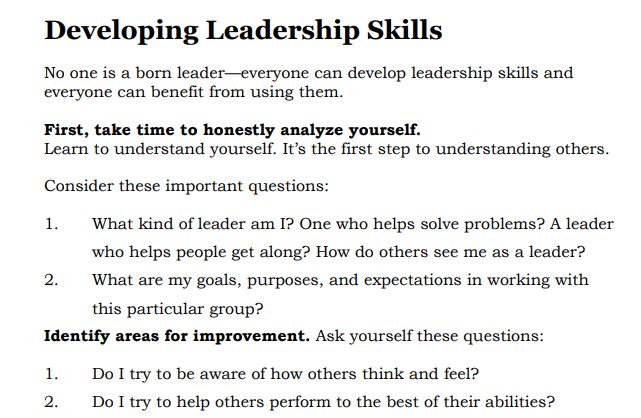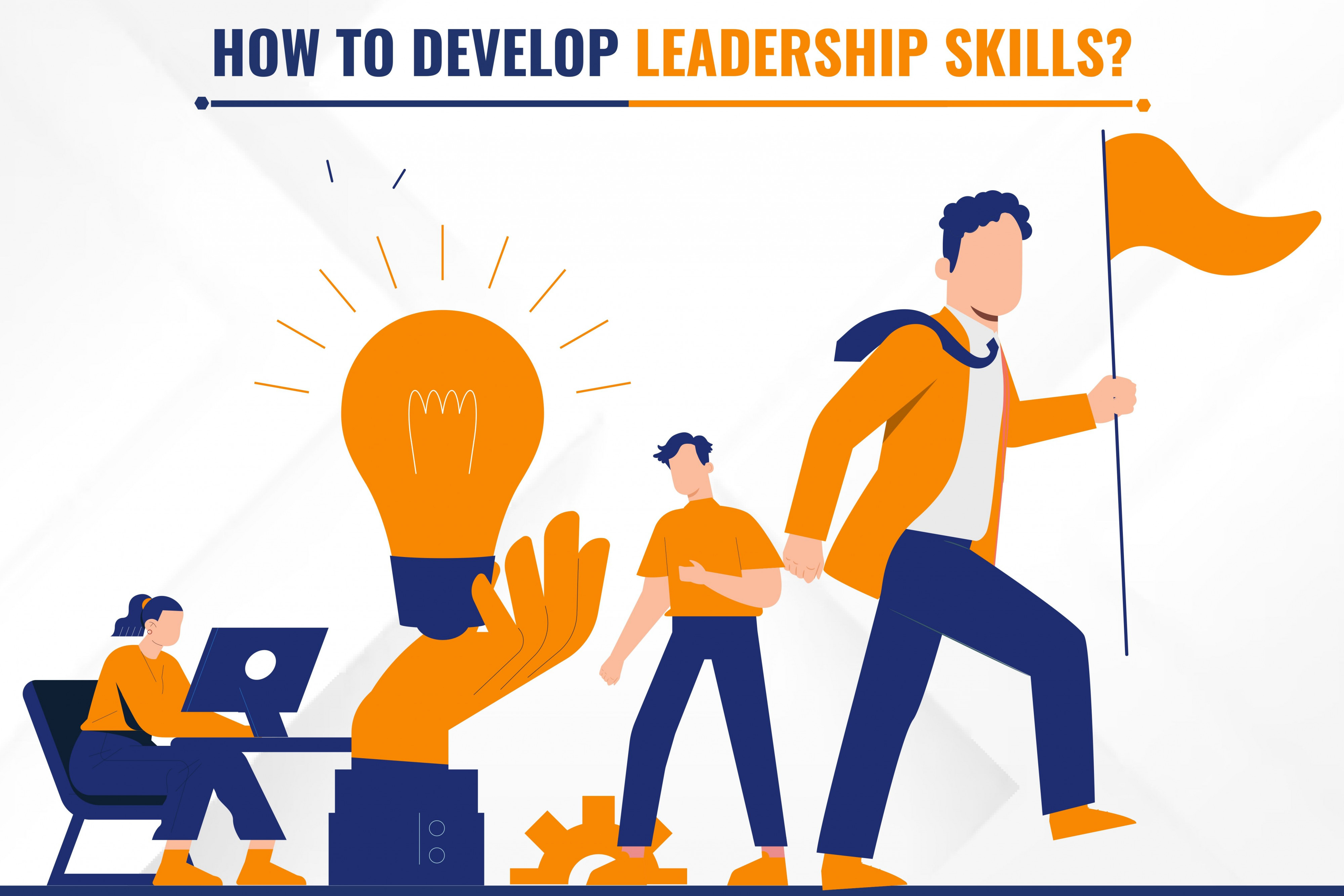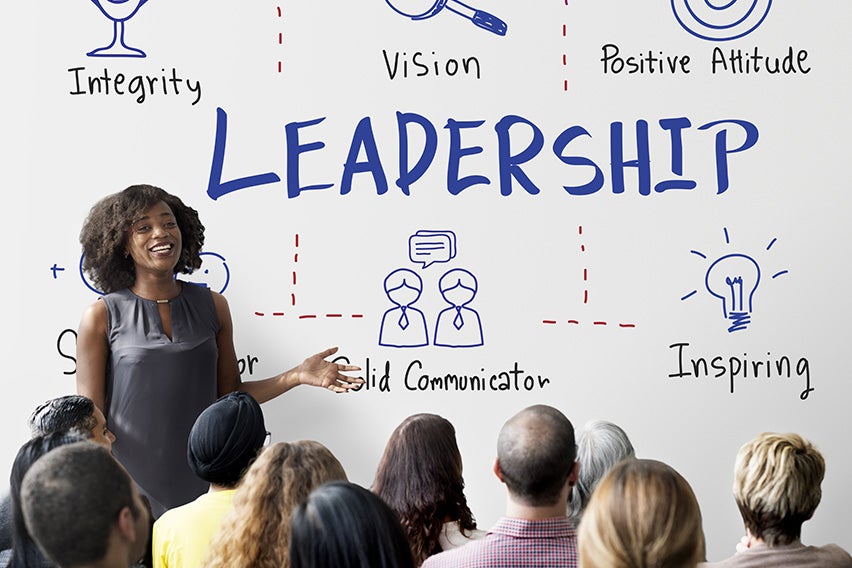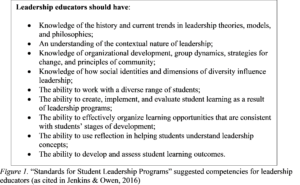How Do I Develop Leadership Skills?
To develop leadership skills, focus on identifying and utilizing your strengths while continuously seeking opportunities for growth. Developing leadership skills is crucial for individuals looking to excel in their careers and make a positive impact in their organizations.
Whether you aspire to be a team leader, a manager, or a CEO, honing your leadership skills is essential. Effective leadership is not solely based on the title or position one holds but rather on the ability to influence and inspire others.
By identifying your strengths and leveraging them, you can develop the confidence and competence necessary to lead. Additionally, actively seeking learning opportunities, such as attending leadership workshops or reading leadership books, can further enhance your skills. With dedication and practice, anyone can develop and excel in their leadership abilities.
Importance Of Leadership Skills
Effective leadership skills play a crucial role in personal and professional development. Whether you’re leading a team at work, managing a project, or guiding a group of individuals towards a common goal, having strong leadership skills is essential. This article explores the importance of leadership skills in two key areas: enhanced decision making and effective team management.
Enhanced Decision Making
Leadership skills empower individuals to make better decisions both for themselves and their teams. By honing these skills, leaders develop the ability to analyze situations critically, consider diverse perspectives, and assess potential risks and rewards. With the capability to think objectively, leaders can make informed choices that lead to positive outcomes.
Moreover, leadership skills help individuals build confidence in their decision-making abilities. This confidence enables leaders to take decisive action even in ambiguous situations. They can weigh the pros and cons and make choices that align with their team’s goals and objectives.
Effective Team Management
Leadership skills are instrumental in fostering effective team management. Strong leaders excel in communication, motivating team members, and providing clear expectations. They establish a collaborative environment where ideas are valued and creativity can flourish.
Admirable leaders possess the ability to delegate tasks and responsibilities efficiently. They understand the strengths and weaknesses of each team member, assigning tasks that maximize individual potential and contribute to the overall success of the team.
Additionally, leadership skills enable leaders to manage conflicts within the team constructively. With effective communication and conflict resolution techniques, leaders can foster a harmonious working environment where team members feel heard, valued, and motivated to perform at their best.
To sum up, the importance of leadership skills cannot be overstated. They enhance decision-making capabilities and promote effective team management. Leaders who possess these skills are better equipped to lead their teams towards success, fostering growth and achieving desired outcomes.

Credit: www.movedemocracy.org
Identifying Leadership Qualities
Developing leadership skills involves identifying key qualities that are essential for effective leadership. By focusing on self-awareness, communication, decision-making, and adaptability, individuals can cultivate their leadership abilities and become influential leaders in any situation.
Self-awareness And Emotional Intelligence
Developing leadership skills begins with self-awareness and emotional intelligence. By understanding yourself and your emotions, you can effectively navigate through challenging situations and inspire others to follow your lead.
Self-awareness entails recognizing your strengths and weaknesses, acknowledging your values and beliefs, and being aware of how your actions impact others. When you have a clear understanding of who you are and what you stand for, you can lead authentically.
Emotional intelligence, on the other hand, refers to the ability to recognize and regulate your own emotions and understand the emotions of those around you. It involves empathy, active listening, and effective communication. Leaders with high emotional intelligence can create a positive and supportive work environment where individuals feel valued and motivated.
Communication And Influence
Another key aspect of developing leadership skills is effective communication and influence. As a leader, you must be able to articulate your ideas clearly and engage others in meaningful conversations. Strong communication skills not only help convey your vision and goals but also foster trust and build strong relationships.
Active listening is an important component of effective communication. By listening attentively to others, you can gain valuable insights and demonstrate that you value their input. This inclusion and collaboration promote a sense of ownership among team members and motivate them to contribute to the shared goals.
In addition to communication, a leader must possess the ability to influence others. Influence is the power to inspire and guide individuals towards a common objective. Through persuasion, negotiation, and leading by example, leaders can motivate their team members to go above and beyond, driving success for the entire organization.
Tips For Developing Leadership Skills
Developing leadership skills is crucial for personal and professional growth. Whether you aspire to lead a team at work, volunteer in your community, or become a role model for others, enhancing your leadership abilities will pave the way for success. In this blog post, we will explore some valuable tips to help you develop your leadership skills and become an effective leader.
Seeking Mentorship And Role Models
Having a mentor or role model can significantly contribute to your leadership development. A mentor is someone who has already achieved what you aspire to accomplish and can guide you along the way. They provide valuable insights, advice, and support to help you navigate through challenges and make informed decisions. It is essential to identify individuals whose leadership skills you admire and reach out to them for guidance.
Taking Initiative And Facing Challenges
Leadership demands initiatives and the ability to face challenges head-on. To develop your leadership skills, you must step out of your comfort zone and take on new responsibilities. By actively seeking opportunities to lead projects or initiatives, you demonstrate your willingness to grow and test your abilities. In doing so, you gain valuable experience and build your confidence as a leader.
Leadership Development Programs
Leadership development programs are designed to equip individuals with the necessary skills and knowledge to become effective leaders. These programs provide opportunities for individuals to enhance their leadership capabilities through various forms of education and training.
Formal Education And Training
Formal education and training are fundamental components of leadership development programs. This involves enrolling in courses or programs that offer comprehensive instruction on leadership theories, principles, and practices. Formal education can be obtained through universities, colleges, or specialized institutions that offer leadership programs.
During formal education, individuals receive in-depth knowledge on various aspects of leadership, including communication, decision-making, problem-solving, and conflict resolution. These programs typically include lectures, assignments, and assessments to test the understanding and application of leadership concepts.
Workshops And Seminars
Workshops and seminars play a critical role in leadership development programs. They provide practical, hands-on learning experiences that allow individuals to gain valuable skills that can be immediately applied in real-life situations. These interactive sessions allow participants to engage with industry experts and fellow aspiring leaders.
Workshops and seminars cover a wide range of leadership topics, including team-building, effective communication, strategic planning, and emotional intelligence. Through group activities, case studies, and role-plays, individuals develop practical leadership skills and learn to adapt to dynamic organizational environments. These sessions often provide opportunities for networking and knowledge sharing among participants.
Practicing And Applying Leadership Skills
Developing leadership skills is an ongoing process that requires practice and application. By actively engaging in leadership opportunities throughout your personal and professional life, you can enhance your abilities to lead projects and initiatives, as well as manage and motivate others. In this article, we will explore two crucial aspects of practicing and applying leadership skills: Leading Projects and Initiatives and Managing and Motivating Others.
Leading Projects And Initiatives
Being able to successfully lead projects and initiatives is a key hallmark of effective leadership. When you take charge of a project, it’s important to establish clear goals and objectives. By doing so, you provide a clear direction for your team to follow. Additionally, you should regularly communicate progress and updates to ensure everyone is aligned and on track. Assigning tasks and responsibilities to team members based on their individual strengths and skills can also maximize productivity and efficiency.
Moreover, effective delegation is another crucial skill to develop as a leader. Delegating tasks and responsibilities allows you to focus on higher-level strategic decisions, while empowering your team members to take ownership of their work. By distributing responsibilities, you enable your team to grow and develop their own skill sets, ultimately benefiting the project as a whole.
Managing And Motivating Others
Managing and motivating individuals within your team is an essential aspect of leadership. Building strong relationships with your team members fosters trust and loyalty, which in turn improves collaboration and productivity. Regularly providing constructive feedback and recognition for a job well done helps to develop and maintain a positive and motivating work environment.
Furthermore, as a leader, it’s important to ensure that each team member feels valued and understood. Taking the time to listen to their ideas, concerns, and feedback demonstrates your support and commitment to their growth and success. By understanding their individual motivations and strengths, you can effectively assign tasks that align with their interests and abilities, thereby boosting their engagement and job satisfaction.
| Key Points: | Leading Projects and Initiatives | Managing and Motivating Others |
|---|---|---|
| Establish clear goals and objectives | Build strong relationships and foster trust | |
| Regularly communicate progress and updates | Provide constructive feedback and recognition | |
| Assign tasks and responsibilities based on individual strengths | Listen to ideas, concerns, and feedback | |
| Practice effective delegation | Understand individual motivations and strengths |
By consistently practicing and applying these leadership skills, you will not only develop your own abilities but also inspire and empower those around you. Remember, leadership is not just about achieving individual success, but about nurturing the growth and success of your team as well.
.png)
Credit: anywhereapp.io

Credit: www.learnow.live
Frequently Asked Questions Of How Do I Develop Leadership Skills?
How Can I Develop My Leadership Skills?
To develop your leadership skills, start by setting goals, practicing self-awareness, seeking feedback, and continuously learning and improving.
What Are Some Effective Strategies For Developing Leadership Skills?
Effective strategies for developing leadership skills include seeking out leadership opportunities, building strong relationships, learning from successful leaders, and regularly self-reflecting on your leadership strengths and weaknesses.
Can Leadership Skills Be Developed Through Training And Practice?
Yes, leadership skills can be developed and improved through training programs, workshops, coaching, networking, and consistent practice in real-life leadership situations.
Conclusion
To become a successful leader, focus on continuous learning and self-improvement. Cultivate strong communication skills and actively listen to the needs of others. Embrace challenges and seek opportunities for growth. Set specific goals and practice perseverance. Remember that leadership is not limited to a title; it is a mindset and a way of positively influencing those around you.
By prioritizing these strategies, you can develop leadership skills that will benefit you both personally and professionally. Start your leadership journey today!





